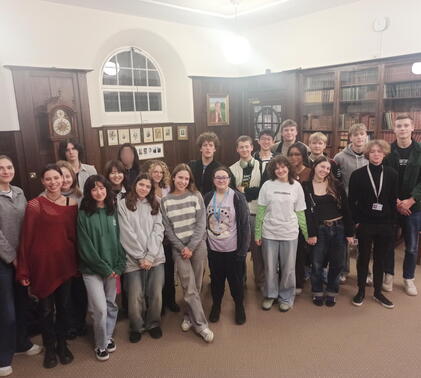
This week saw the very first meeting of our Slavic and Eastern European Society, which has been founded by two of our boarders: Daria (Year 12) and Simona (Year 11). The turnout was very promising with over 10 different nationalities around the table as well as 13 languages spoken!
One of the items discussed was the name of the Society as well as what characterises the Slavic and Eastern European nations, since it is not only about the geographical aspect but also the cultural one. We interviewed the founders of the society to find out more about what inspired them to set up this new society at Sidcot, and what they're hoping to achieve moving forwards:
Introduce yourselves!
Hi, I'm Daria and I'm leading the Society. I’m currently in Year 12 and I'm doing my IB Diploma. I was born and raised in Germany, but my family is from several Slavic and Eastern European countries, so I was brought up experiencing multiple cultures at once. My mother tongues are Russian and German and I started learning English when I was six years old. I’ve been at Sidcot since Year 11, so it’s my second year here.
Hello, my name is Simona, and I'm the deputy. I am currently in Year 11 and doing my GCSE’s. I was born in Russia, but I am half Bulgarian, and half Georgian. I speak Russian, Bulgarian and English. I have been at Sidcot for four years now.
What inspired you to set up the Slavic and Eastern European Society?
The priority is to show that despite the conflicts happening globally, we are still a community with many things in common. We also hope the Society will provide a safe place for students to share their worries about conflicts around the world, and to create an open forum for differing points of view or perspectives to be discussed. It was also important to us to share our traditions and beliefs with the School community and teach people about our culture as the Slavic and Eastern European community is Europe’s biggest one, with more than 25 countries part of it, and 11 representatives at Sidcot. As we also have different holidays and celebrations we want to provide a place for people who are part of the community to be able to celebrate these holidays, and open it up to all other students, so they can experience something new.
It is often assumed that the Slavic and Eastern European countries are all the same. This is not the case as every single country has a cultural difference, which we want to explore and provide the place for it to be celebrated.
Why did you think it was important to have representation for Eastern European countries at Sidcot?
Having representation was something really important for us, because there is a lot of misinformation concerning the Slavic and Eastern European countries. It is commonly assumed that everyone just speaks Russian and is fully absorbed by the Russian cultures and habit. While that is partially true and a lot of people speak Russian, all the countries have their own language, culture and heritage, and it is really important to teach and celebrate that.
We also wanted to have a safe space to celebrate our holidays and to teach people about what is different and what maybe is even the same about the holidays.
Tell us about the first meeting!
16 people attended the meeting including Simona and me. At the first meeting we mainly explained our aims to everyone and talked about a potential name, because the current one is quite long. We also spent a bit of time introducing ourselves to one another, saying where we are from and what language we speak.
Later on we also talked about what activities we might plan throughout the year, and just brainstormed some ideas. There was more discussed in the meetings after, and we decided on a few activities that we are going to plan.
Thank you. Watch this space for more information from the Society!


